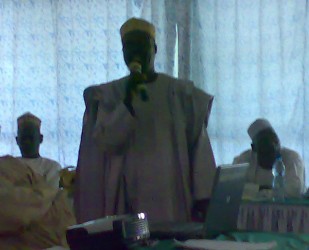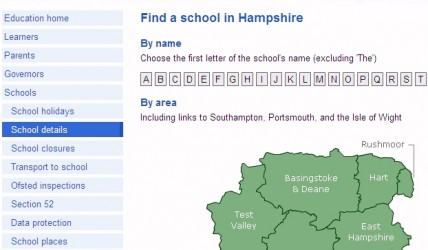Just before Xmas, as reported on my 'back to basics' post, Kano State was just starting the data entry of the annual school census that the Education Sector Support Programme in Nigeria (ESSPIN) programme had been supporting. My managers are always challenging me '.. Yes Ian that's great but what are the numbers, how many kids are now in school? etc....' and the simple fact is without reliable data the straight answer is: 'We're not sure!'
This morning I was at a meeting where Muhammed Dayyamu, the Kano Ministry of Education school census manager, was succinctly reporting back the excellent progress. While the rest of us were stuffing back the turkey sandwiches and recovering from New Year Eve's excesses back in January, the Kano data entry team had been busy, very busy.

Within 6 weeks they had entered data from over 6,600 schools and had established that they were a lot closer to knowing how many schools in the state there actually are. An additional 88 senior secondary schools and 174 private schools had been 'discovered', while in some areas schools had disappeared: the Kano municipality had 10 less junior secondary schools than first thought. Everybody 'got' why having a master list of schools and keeping it active was important, if only for tax collection purposes from the private schools!
Compare this to finding out about schools in the UK. I wanted to know more about schools in Hampshire (UK) recently. A quick search via the council website and not just school lists appeared, but catchment maps and OFSTED inspection reports full of learning outcome data, school specialism areas and improvement plans.

In addition to completing the data entry, there was also some checking and quality control being introduced, including a verification exercise. This is more important than it might sound - massive distortions that make a lot of information useless is commonplace. Just last week I went to a school in a neighbouring state that had quadrupled its enrolment of a plan, probably to try and get a larger budget.
The next step as I emphasised to Muhammed and the local government staff at the meeting was to turn the magic handle and actually collate the key statistics on students, the gender gap and the like. This is the information we are still starved of, to help states like Kano expand and improve their education system.
Hopefully I can report soon on how many kids are in school in Kano and get my 'results focussed' managers off my back!

8 comments
Comment by Cindy Collins posted on
I have the opposite problem as you do. I have data (fresh data) and video clips from the Niger Delta oil-hosting, riverine communities that I want to share with the international community here. I am an American social scientist (taught quantitative/qualitative methods at American University in DC and am M&E trainer) working for a Nigerian NGO based in Warri. Trying to make contact with international organizations in Abuja has been beyond frustrating. I have sent emails. I have made phone calls and left voice messages (I have made 14 phone calls to 7 organizations and no one has answered their phone). And all I want to do is to share our data, videos and experiences from the riverine communities. We did surveys in 10 oil-producing communities last month (our info is in our Citizen Report Card found on our website). We are conducting surveys in 24 more communities this month. Please. How do I get an audience to share our data?
Comment by Nigeria: do donors know what they’re spending? (updated) | Africa | Global Dashboard posted on
[...] inadequate, whether at national or at state level. Recently, for example, Kano state has just been counting its schools: An additional 88 senior secondary schools and 174 private schools had been [...]
Comment by Ian Attfield posted on
Hi Cindy,
Thanks for you comments and I can well imagine your frustrations, struggling to disseminate the results of your work. Some of the lack of interest may be down to communications (landlines as you know don't work well), but also because many agencies only work in a limited number of Nigeria's many States and the Delta is one of the least popular areas to engage because of the perceived insecurity and larger volumes of wasted government resources.
I'm happy to plug your citizen's reports cards: via google I found them and from a glimpse it certainly looks interesting: http://www.nidprodev.org/research-a-data/citizen-report-card-march-2010 .
I'll pass on the link to some of colleagues interested in voice and accountability, sounds also like USAID should be interested in your work?
Comment by joyce ogunyemi posted on
Hi Ian,
I am a student of Education and International Development at the Institute of Education London and I follow your blog regularly. Seeing that you have great insight into the Nigerian situation, I would like to ask a few questions please.
1. What is the educational planning problem DFID is responding to in Nigeria
2. What is the planning dimension in the response and what is the analytic framework/tools used
I will also be asking for a contact in the World Bank that can assist with answering the same questions on WB projects in Nigeria.
Thanks and appreciate your time.
Best regards,
Joyce Ogunyemi
Comment by Ian Attfield posted on
Both DFID and the World Bank support systemic approaches to education sector data collection, analysis and the creation of long and medium term plans as a basis for government budgeting and implementation. More details can be found on the following websites:
http://www.esspin.org
http://web.worldbank.org/external/projects/main?pagePK=64283627&piPK=73230&theSitePK=368896&menuPK=368928&Projectid=P096151
Comment by Joyce Ogunyemi posted on
Many thanks Ian
Best wishes
Joyce
Comment by Debbie Edwards posted on
Hi Ian
Thanks for the blog, I always enjoy reading it. I have alot of interest in the area of primary and secondary education in Nigeria as I beleive that this is where we can acheive the most with our future adult population.
I am currently working with the Guild of Artistes and Poets (GAP) In Abuja on an initiative to go into some of the more deprived schools in Abuja and environs and promote books and reading.
Our first step will be to earmark schools which may be interested in welcoming us for reading and writing workshops. We'd be happy to go further North with this idea should it prove successful here.
How would you advise we proceed? Do you have any ideas?
Comment by Daren Midura posted on
so much superb information on here, : D.